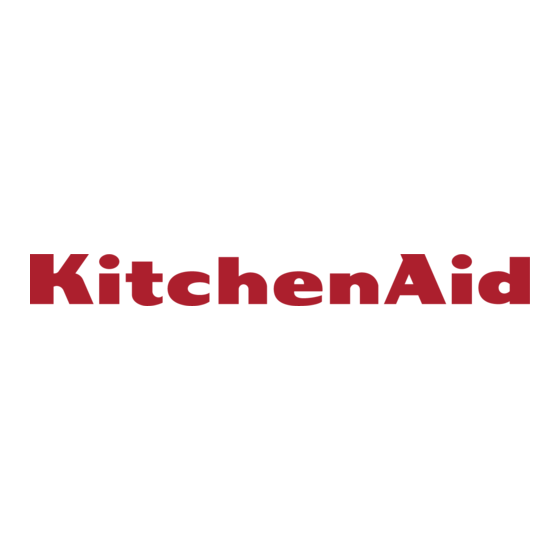KitchenAid 30" (76.2 CM) WALL-MOUNT CANOPY RANGE HOOD Manuale di istruzioni per l'installazione - Pagina 5
Sfoglia online o scarica il pdf Manuale di istruzioni per l'installazione per Gamme KitchenAid 30" (76.2 CM) WALL-MOUNT CANOPY RANGE HOOD. KitchenAid 30" (76.2 CM) WALL-MOUNT CANOPY RANGE HOOD 20. 30” (76.2cm) sealed burner gas slide-in range with self-cleaning thermal/convection oven
Anche per KitchenAid 30" (76.2 CM) WALL-MOUNT CANOPY RANGE HOOD: Manuale di istruzioni per l'installazione (7 pagine)

For Best Performance:
Use 26-gauge minimum galvanized or 25-gauge minimum
aluminum metal vent. Poor quality pipe fittings can reduce
airflow. Flexible metal vent is not recommended.
NOTE: Local codes may require a heavier gauge material.
Metal duct may be reduced to 30-gauge galvanized steel or
26-gauge aluminized steel if allowed by local codes. This
reduction is based on information in the International
Residential Codes Section M1601.1 (2006 edition).
Do not install 2 elbows together.
Use no more than three 90° elbows.
If an elbow is used, install it as far away as possible from the
hood's vent motor exhaust opening.
Make sure there is a minimum of 18" (45.7 cm) of straight
vent between the elbows if more than one elbow is used.
Elbows too close together can cause excess turbulence that
reduces airflow.
Do not use a 5" (12.7 cm) elbow in a 6" (15.2 cm) or 3 " x 10"
(8.3 x 25.4 cm) system.
Do not reduce to a 5" (12.7 cm) system after using
6" (15.2 cm) or 3 " x 10" (8.3 x 25.4 cm) fittings.
Avoid forming handmade crimps. Handmade crimps may
restrict airflow.
Use a vent cap for proper performance. If an alternate wall or
roof cap is used, be certain the cap size is not reduced and
that it has a back draft damper.
Use vent clamps to seal all joints in the vent system.
Use caulking to seal exterior wall or roof opening around the
cap.
The length of vent system and number of elbows should be kept
to a minimum to provide efficient performance.
The maximum equivalent length of the vent system is 60 ft
(18.3 m). For altitudes above 4,500 ft (1372 m), reduce
recommended vent run by 20% for best performance.
Cold Weather Installations
An additional back draft damper should be installed to minimize
backward cold air flow and a thermal break installed to minimize
conduction of outside temperatures as part of the vent system.
The damper should be on the cold air side of the thermal break.
Makeup Air
Local building codes may require the use of makeup air systems
when using ventilation systems greater than specified CFM of air
movement. The specified CFM varies from locale to locale.
Consult your HVAC professional for specific requirements in your
area.
Venting Methods
Common venting methods are shown for a counter-mounted
downdraft cooktop. The cooktop may be vented through the wall
or floor.
Option 1 - Roof Venting
B
A
A. Roof cap
B. 6" (15.2 cm) round roof venting
Option 3 - Venting Between
Floor Joist
B
A
A. Wall cap
B. 6" (15.2 cm) round wall venting
Concrete Slab Installations -
Exhaust Through Window Well
B
A
C
N
M
L
A. Wall cap
B. 12" (30.5 cm) minimum
C. Concrete slab
D. 6" (15.2 cm) round PVC sewer pipe
E. 5" to 6" (12.7 cm to 15.2 cm)
transition
F. 6" (15.2 cm) round metal duct
G. 6" (15.2 cm) round PVC coupling
H. 6" (15.2 cm) round PVC sewer pipe
Option 2 - Wall Venting
B
A
A. 6" (15.2 cm) round wall venting
B. Wall cap
Option 4 - Venting behind
Cabinet Kick Plate
B
A
A. Wall cap
B. 6" (15.2 cm) round wall venting
E
D
F
G
H
I
K
J
I. 6" (15.2 cm) round 90°
PVC sewer pipe elbow
J. Tightly pack gravel or sand
completely around pipe.
K. 42 ft (12.8 m) max.
L. 6" (15.2 cm) round
PVC coupling
M. 6" (15.2 cm) minimum
N. Window well
5
